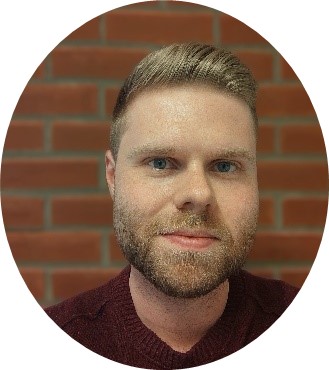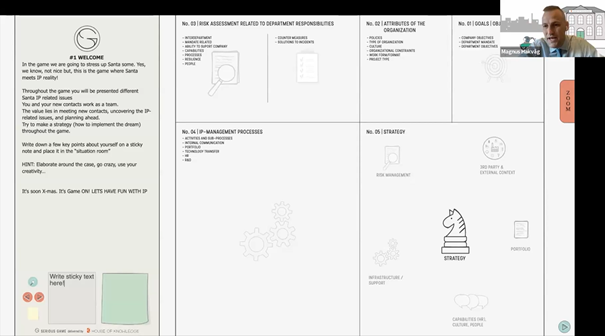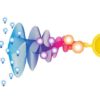A Serious IP-Department Game: 5th module MIPLM
On Saturday, 27th of May, the first IP-department game in the world was deployed for the first time with the MIPLM (Master of Intellectual Property Law and Management) class of 2022/2023 at CEIPI. Playing the game results in a mapping of an IP department with all its processes, strategies, objectives, risk assessments, and more.
The “Serious IP-Department Game” was created by House of Knowledge in cooperation with CEIPI, tailored for the MIPLM, and marks a start for game-based training at CEIPI. The game was fine-tuned using input from Hanns Hallesius, Hallesius Consulting and previous Head of IP at Electrolux, and Shu-Pei Oei, Global IP Lead & Senior Patent Counsel at an Austrian-based MNC.
The “Serious IP-Department Game” is designed to create an engaging, facilitated exchange of experience and knowledge. Play happens in groups of 3-5 where the centerpiece of the game is an IP-department canvas, which is used to structure and evaluate relevant information (presented on playing cards), reveal interrelations, and support discussion. The game was played digitally by the MIPLM class, but it can also be played on-site with a physical game.
When playing the game, participants grapple with how to set up and structure a simulated IP department, establishing relevant strategies to reach key objectives. Realistic scenarios are presented throughout gameplay, creating a basis for discussion and problem-solving that requires participants to share and apply their collective knowledge and experience.
During the game, played over 5 hours, the players assist the firm AIB and their CEO B.I.G with agreeing on the most suitable objectives of the IP department. This entails analyzing the firm’s internal context, analyzing risks, establishing strategies, and identifying relevant interdepartmental processes and activities related to the operation of other departments in the firm. Which means, in the end, participants will have established the IP Management System of the firm – not bad for a five-hour session!
Broadly speaking, participants playing this game will get the opportunity to share their own experience and learn from the perspectives of others. The game is intended to support the exchange of contextually sensitive tacit knowledge and experiences regarding best practices. This should strengthen collective insight and capability. By broadening the scope of understanding with diverging perspectives, players can gain a greater appreciation of how others engage in establishing an IP department and exchange best practices. Furthermore, the collaborative problem-solving processes around which the game is designed may facilitate the acquisition of novel skills and the emergence of tacit knowledge.
FACT:
Serious games – games with another primary purpose besides enjoyment – has become more and more commonplace over the last few years. The term has been used to describe a wide range of different games – digital and physical, single- and multi-player, across diverging topics and disciplines. These games are used for achieving a plethora of different objectives, often entailing learning in a broad sense, the sharing of experience and knowledge between players, and combining theoretical understanding with practical application.
About the authors:
 Magnus Hakvåg is CEO of House of Knowledge, a consultancy that offers strategic advice on how best to protect a company’s innovations and competitive advantages. An expert of over 20 years in innovation, IP/IPR and standards, Magnus served as Convenor of the ISO working group on innovation management terminology (leading to the publication of ISO 56000:2020) and was involved in the revision of the OECD Oslo Manual (4th edition, 2018). He was also part of the European Commission’s “Joint Initiative for Standardisation (Action 3) and is part of DG Grow AASTART (academics active in standardisation-related reseach and training) which highlights the need for standardization as an element of formal education, academic and vocational training, and has been a consultative body for the Norwegian Ministry of Trade and Commerce on IPR and standards. Magnus earned an MSc in Biophysics and Medical Technology from the Norwegian University of Science and Technology.
Magnus Hakvåg is CEO of House of Knowledge, a consultancy that offers strategic advice on how best to protect a company’s innovations and competitive advantages. An expert of over 20 years in innovation, IP/IPR and standards, Magnus served as Convenor of the ISO working group on innovation management terminology (leading to the publication of ISO 56000:2020) and was involved in the revision of the OECD Oslo Manual (4th edition, 2018). He was also part of the European Commission’s “Joint Initiative for Standardisation (Action 3) and is part of DG Grow AASTART (academics active in standardisation-related reseach and training) which highlights the need for standardization as an element of formal education, academic and vocational training, and has been a consultative body for the Norwegian Ministry of Trade and Commerce on IPR and standards. Magnus earned an MSc in Biophysics and Medical Technology from the Norwegian University of Science and Technology.
 Håvard Almås is a researcher at House of Knowledge and an industrial Ph.D. candidate of organizational psychology jointly at the Norwegian University of Science and Technology (NTNU) and House of Knowledge. His research interests include collaborative learning, teamwork, engagement in play, serious games, and organizational development more broadly. Previously he has been engaged in research on the digital transformation of non-digital board games, the formation of learning experiences in serious games, and the emergence of collaboration in small player groups.
Håvard Almås is a researcher at House of Knowledge and an industrial Ph.D. candidate of organizational psychology jointly at the Norwegian University of Science and Technology (NTNU) and House of Knowledge. His research interests include collaborative learning, teamwork, engagement in play, serious games, and organizational development more broadly. Previously he has been engaged in research on the digital transformation of non-digital board games, the formation of learning experiences in serious games, and the emergence of collaboration in small player groups.



